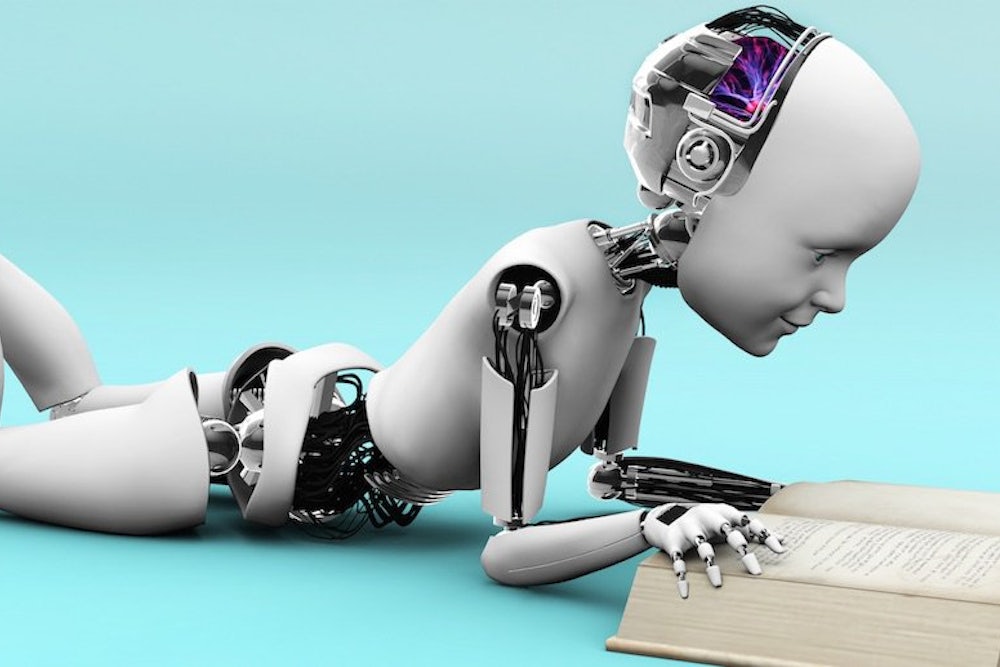In a recent article for The Atlantic, Derek Thompson visits Youngstown, Ohio, to portray the “postwork” society that is being created as machine labor replaces more types of professional human labor. The last person Thompson interviews is Howard Jesko, a 60-year-old graduate student at Youngstown State who plans to become a college professor.
As a college professor, I appreciate that Jesko is continuing his education. But I wonder about his future career and the careers of our colleagues. Colleges and universities are where people go to train for the professional jobs that are increasingly being automated, including pharmacy, accounting, journalism, and even clinical psychology. If machines are turning the “job” into a twentieth-century relic, then who are Jesko and I going to teach? And why?
Universities should remain central to preparing people for a future postwork society. For one thing, machines can’t design themselves (yet), and people will have to learn how to design them. But that mission alone is not enough to justify higher ed altogether. If universities are to prepare people for a world without work, then they will have to rethink the purpose of undergraduate education. They will have to shift focus away from training students for dying professions and toward building their knowledge in fields that a postwork society will actually need: arts, literature, politics, religion, and ethics.
We can already see some professional education becoming obsolete. A high school student who applied to pharmacy degree programs in 2007 seemed to be making a rational decision, as a 2000 report to Congress by the Department of Health and Human Services forecast huge labor shortages and reported six-figure salaries for new pharmacists. Now that student has just graduated with a Pharm.D. degree, but while she was in school, pharmacies bought machines to fill their labor needs. Her degree became impractical before she even got to use it.
It’s tempting but unwise to try to outsmart the job market in choosing a degree program, especially when highly specialized nonhuman competitors are flooding the market. Instead of trying to find the last thing that machines can’t do and majoring in that, students today who want to flourish in the six or more decades of their post-college lives should look to the liberal arts. That's because when machines work and humans do not, the most pressing questions are in fact not technical, but humanistic: What will we do with our time? How will we live lives of meaningful leisure?
Although college students tend to have active social lives but not full-time jobs, they do not necessarily know how to take leisure. The students I know view college entirely in terms of work: Classes feel like work, in preparation for harder work after they graduate. Despite their youth, many of them see the real meaning of work in retirement; that’s when they will really get to relax and enjoy themselves.
Unless their universities push them to develop a more positive and expansive view of leisure, my students may struggle to find meaningful activity in a postwork future. This is where literature, the arts, and philosophy can help. Industrial-age critics like W.E.B. Du Bois and Josef Pieper saw liberal learning and contemplation as the soul of human culture. Even video games—a form of leisure that will surely become even more popular—are better if they are more philosophical.
The problem of leisure is easy to solve in comparison with the problem of how to redefine wealth and allocate the proceeds of machine labor in a just way. What does a decent society look like if there isn’t enough full-time work for more than, say, one-fifth of adults? How do we avoid according that minority the kind of privilege characteristic of elites in a Snowpiercer-like dystopia? Answering these questions will demand the collective wisdom of the whole society, and narrowly focused professional degree holders will have little to offer.
Because universities expand and contract degree programs more in response to student demand than by estimating long-term social benefit, they mimic the fearful decision-making of 17-year-olds who more than anything else want to embark on a good-paying career at graduation. So to please students (and their parents), universities prepare them for the economy and society of the recent past. This has to change.
Many graduates starting out in the professions now may not have a career at all after age 40. So to meet their students’ future needs, and not just their present desires, universities will have to rise out of their reactionary traditionalism and become a more progressive social force. They can start by convincing people who are not yet students that with excellent cultural, political, and moral education, a jobless future can still be very bright.
